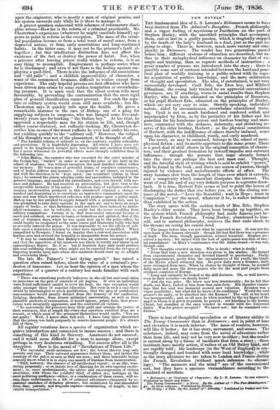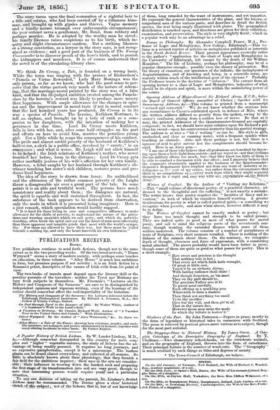NEW NOVELS. * THE fundamental idea of L. S. Lavenu's _Erksmere
seems to have been derived from. The Admiral's Daughter. "-tench philosophy and a vague feeling of mysticism or Pantheism on the part of Stephen. Harley, with the unsettled principles that - accompany them,- enlist last in a guilty passion, which is tragically stopped by the death of the lady's husband in a duel, just as the pair are going to elope. There is, however, much more variety and com- plexity in .Erlesmere. irhe reader has two generations passed before him ; different systems of education are described, but ra- ther in their metaphysical influence on character by dint of ex- ample and training, than as regards methods of instruction ; a great number of persons are introduced into the story ; there is possibly some sort of contrast intended between the hardand prac- tical plan of worldly training in a public school with its regu- lar acquisition of positive knowledge, and the mere cultivation of thought and speculation. The idea, if entertained, is not very successfully developed. Cecil Erle, the Eton boy, and Mildred Effingham, the young lady trained by an- approved conventional
if anything, worse in social results than Stephen Harley, who as been educated on the principles of Rousseau, or his pupil Herbert Erle, educated on the principles of Harley, -which- are not very easy to seize. Strictly speaking, individual
nature, aided by circumstances, overwhelms educational train- ing. becil is not so much hardened and rendered selfish and unprincipled by Eton as by the partiality of his father and his guardian for his handsome person and fearless bearing. and man- ners, contrasted with the sickness, deformity, and fahriski g re- serve of his elder brother, Herbert ; as the .physical constitution of Herhertrwith the indifference of others thereby induced, react upon his character,, in childhood, youth, and early manhood.
The novel, as may be -surmised, belongs to the school of meta- physical fiction ; and its merits appertain to tha same genus. There is a good deal of skill shown in the original conception of charac- ters, and their gradual formation by inward impulse and outward influences • though the persons that come already formed into the ;tory are perhaps the best and most real. Thought, and:the forceful style of writing which is said to exhibit "power," will befound in the book ; and there are scenes of passion,though injured by violence and melodramatic efforts at effect. The story becomes slow from the length of time: over which it extends, and a complexity which somewhat dissipates the interest. The want of real life and of any very definite purpose is a greater draw- back. It is true, Herbert Erle seems at last to point the lesson of discharging the duties that rise before you, or, in the closing sen- tence of the novel—" Love the Beautiful ; wait in Hope ; trust in Completion " : yet the-moral, whatever it be, is rather intimated than exhibited in the action.
The story opens with the sudden death of Mrs. Erie, Stephen Harley's eider cousin. . They have been brought up together, on the system which French philosophy had made famous just be- fore the French. Revolution. Young Harley, abandoned to him- self, and to natural philosophy, receives the first rude-shock to his-dreams on seeing his cousin dead.
". The image before him was not what he expected to see. It was not the mere husk of the human chrysalis : though life had there was a presence of death. The form, though passionless, seemed tenanted. Stephen per- ceived a mystery; for mixed with the look of spirit-peace was: that of mor- tal punishment : on Mary's countenance was the Adam-brand—it was sad, though calm. " New thoughts crowded on him. Why is death? what is death ?
" From that time a new direction was given to his studies. He tinted from experimental chemistry and devoted himself to psychology. Partly from temperament, partly from the circumstances of his youth.„ the tenets of. the Mystic school attracted him. He grew daily more a dreamer, daily more estranged from men. When by chance he thought of them, he scorned daily more and more the down-gazers who for the most part people these civilized countries of Europe.
" Long and earnestly he looked at the still features. Oh, so well known, even in their severity—so dearly loved !
"And. she was gone. He knew now how irretrievably ; for he felt that death, not Mary, looked at him from that calm form. His chamber reason- ings that her soul was immortal seemed now valueless. Reunion was, a vague possibility ; but whatalid he know of its conditions ? Would the soul preserve its unity, or be absorbed into the 'Cosmos? The cold at his heart was insupportable ; and, as all men do when touched by the icy finger of the angel to whom it is given to punish, he prayed ; not kneeling to the human Christ, but standing at the open window in. wrestle with the Universal Spirit. Was his prayer accepted ? We know not : but he remained com- fortless."
There is less of thoughtful speculation or of literary ability in . The Young Commander than in Erlestnere ; and in point of-tone and elevation it is-much inferior. The mass of readers, however, -will like it better ; for it has story, movement, and scenes. The substance, indeed, may come from, the novel of adventure-rather than from life, and may not be very new to either ; but the- reader is carried along by a.tissue of incidents that form a story ; those incidents have mostly action, if rather of an Old Bailey kind, and are rapidly told ; the landscape (in the 'West of England)- is con- tinually changed and touched with some local knowledge ; - while as the story advances we are taken to London -and Frame during the French. Revolution (without much referent* to chrono- logy). "The manners and the mind" are of the conventional sort, but they have a specious vraisemblance according to 'the standard of novelists.
• Briesmere ; or Contrasts of Character. By L. S. Lavenu. In-two volumes. Published by Smith and Elder. The Young Commander : a Novel. By the Author of " The Twolfillehapsnen," 4.c. In three volumes. Published by Newby. Be Creasy: a Tale. By the Author of" Dorothy." Published by Parker and Son.
The story turns upon the final restoration of a rightful heir to a title and estates, who had been carried off by a villanous kins- man, and brought up with gipsies and thieves. Vague memory and. a kindly nature triumph over unfavourable circumstances ; the poor outcast saves a gentleman, Mr. Bond, from robbery and perhaps murder. He is adopted by the worthy man he saved ; his family likeness raises suspicions as to his birth, which in- quiry and slight circumstances confirm. But a striking likeness or a strong conviction, as a lawyer in the story says, is not recog- nized as evidence ; and a good part of the business of The Young Commander is to discover proofs of the hero's birth, and to punish the kidnappers and murderer. It is of course understood that the novel is of the circulating-library class.
We think De Cressy, a Tale,. is founded on a wrong basis. While the town was ringing with the praises of Richardson's " Pamela or Virtue Rewarded," Lady, Mary Montagu was the only person, so far as we know, who had the good sense to per- ceive that the virtue partook very much of the nature of schem- ing, that them arriage-moral painted by the story was of a false kind, and that the ill-judged ambition created among the Pamela- class by the heroine's reward was likely to produce more misery than happiness. With ample allowance for the changes in opin- ion and the improvement m moral taste if not in moral conduct that the list hundred years has produced, De Cressy is in its way a species of l'amela. The heroine, Kathleen Mortimer, is left an orphan, and brought up by a lady of rank as a com- panion to her daughters, with the intention of making her a governess in due time. Lord De Cressy meets Kathleen falls in love with her, and, after some half- struggles on his pari and efforts on hers to avoid him, marries the penniless young girl. For a little while he reaps the consequences of his conduct. The pride.and almost sordid poverty of the husband of Kathleen's half-sister, a clerk in a public office, involved by " surety," is an
i
annoyance ; and what is worse, Mr. Leigh will not allow himself to be helped ; the Irish relations of Kathleen's mother, who never troubled• her before loom in the distance; Lord De Cressy gets rather morbidly jealous of his wife's affection for her own family. However, a fever caught by her husband through Kathleen's ob- stinacy touching her sister's sick children, restores. peace and pro- duces final happiness. The idea of the story is drawn from fancy. Its unlikelihood and the obtrusion of the rather common poverty of the Leighs throw a. disagreeable air over a great part of the tale. In some points it is an able and truthful work. The persons have much consistency and reality about them ; the dialogues are natural, the spirit is equable and well sustained-throughout. In fact, the substance of the book appears to be derived from observation, only the mode in which it is presented being imaginary. Here is a just,,Itisrehrnrlf,:wilrhhiosech speculation would hardly suggest. living in ease and comparative affluence to make allowance for the shifts of poverty, to understand the nature of the priva- tions and wearing anxieties which we call petty and which do, notwith- standing, often break the spirit and eat out the heart of man more effectually than those apparent and tangible griefs that meet with the world's sympa- thy. For those are allowed to have their way, but these must be veiled beneath a smiling lip, and only the heart knoweth its own bitterness."



























 Previous page
Previous page